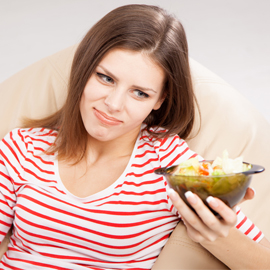Emotional Eating and LAP-BAND Surgery
Posted: Sep 10 in Lifestyle and Activity by Staff
 Emotional eating occurs when we eat in an attempt to cope with emotions like boredom, stress or sadness. This often leads to overeating and makes us feel worse than before, resulting in a cycle of emotions and eating that can hinder weight loss.
Emotional eating occurs when we eat in an attempt to cope with emotions like boredom, stress or sadness. This often leads to overeating and makes us feel worse than before, resulting in a cycle of emotions and eating that can hinder weight loss.
Almost everyone experiences emotional eating to some extent. Learning to prevent this habit can make it easier to maintain lasting weight loss by helping you:
- Control the urge to overeat
- Develop a healthier relationship with food
- Find constructive ways to deal with emotions without eating
The Causes of Emotional Eating
Emotional eating can stem from any emotion. It can coincide with major life events, like health problems or financial difficulties, or with otherwise mundane occurrences like a lonely night at home. Emotional eating can even be linked to positive emotions as we eat in an attempt to keep our spirits high.
Common causes of emotional eating include:
- Stress. We all have stress in our lives and can struggle to cope with it in a positive way. We may snack throughout the day while feeling stressed at work or overeat at home while worrying about upcoming projects or events. Stress increases our levels of the hormone cortisol, which gives us cravings for sweet, salty and fatty foods.
- Social situations. When we get together with others, we may overeat because others are doing so or because of the sheer amount of food in front of us. Overeating in social situations may also be caused by nervousness.
- Fatigue. When we’re feeling physically or emotionally drained, eating can seem like a way to help ourselves relax and restore some energy.
- Anger. Tension over an argument or frustrating experience can make us seek solace in eating until the tension fades.
- Boredom. When we feel unfulfilled or have little else to do, we may eat to provide enjoyment and distract ourselves.
- Loneliness and depression. Eating can become a way to comfort ourselves when we’re feeling isolated or sad.
- Excitement and joy. Sometimes, eating can be a way to celebrate a special occasion or reward ourselves for an accomplishment.
Emotional eating is frequently used as a crutch to avoid emotions that we’d rather not face head-on. It can become an ingrained habit, especially if food has consistently been used as a reward or a way to cheer ourselves up since childhood.
The Emotional Eating Loop
Emotional eating is an attempt to find comfort through food, but that comfort is short-lived. The emotions that caused us to eat remain unresolved, and we may feel guilt, shame, frustration and disappointment due to overeating, which can cause us to eat even more.
If left unchecked, emotional eating can add a substantial amount of excess calories to our diets each day. Continuing to eat emotionally can make it difficult to lose weight or maintain a healthy weight, even after LAP-BAND surgery.
Overcoming Emotional Eating
To break the habit of emotional eating, you need to find more constructive ways to deal with your emotions. Instead of viewing food as a solution to our problems, consider strategies that will help you get to the core of any emotional issues, so you can feel better without food.
Here are some examples of positive ways to deal with your emotions:
- If you’re feeling bored, watch an exciting movie, read a book or engage in a hobby you enjoy.
- If you’re feeling stressed or angry, go for a walk, take deep breaths or listen to one of your favorite songs.
- If you’re feeling lonely or sad, call a close friend, play with a pet or look at photos that remind you of happy memories.
By making a list of alternative activities like these, you can give yourself a way to deal constructively with your emotions in any situation. Learning to identify and disarm your own emotional eating triggers can also be a valuable step in preventing this habit from inhibiting your progress after LAP-BAND surgery.
